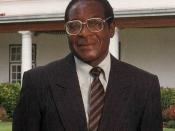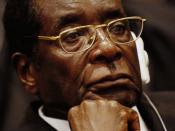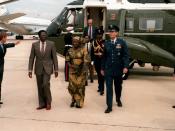This is an era when imperialism has almost ended. Most of the Asian and African countries got their independence in the latter half of the twentieth century. A majority of these have democratic government operating as their legislature. These countries are fast striving towards development after years of oppressive rule under the imperial powers. However, Zimbabwe is one country in which even after independence, the situation has not changed. In fact, it has worsened. The economy is in ruins and people are starving to death. In fact, it can be easily illustrated from Zimbabwe's present situation that Zimbabwe's prosperity has actually declined since independence (Meredith, 7). The irony here lies in the political situation of Zimbabwe. The very own idea of imperialism, of absolute power, which Zimbabwe fought against, is still alive in the country. It is ironical that Robert Gabriel Mugabe, the man who led Zimbabwe in their freedom struggle against the British rule, demanding a free and democratic Zimbabwe, assumes absolute power and has the whole of Zimbabwe at his helm.
Robert Mugabe was elected as the first prime minister of independent Zimbabwe, but, since then, his rule has never ended. Mugabe was born at the Kutama Mission in Southern Rhodesia (Zimbabwe was previously named Southern Rhodesia) on February 21, 1924. After completing his education, Mugabe moved to Ghana where he took to teaching. At that time, Mugabe did not have any vested interest in the nationalist movement going on in modern day Zimbabwe. He had an indifferent attitude towards the British rule in Zimbabwe. However, it is by chance when he, while on a trip to Southern Rhodesia, cancelled his planned return to Ghana, and instead jumped into the nationalist movement (Meredith, 21).
This marked the beginning of Mugabe's political career. When he returned to Southern...



Drives the point home.
Uses clearly appropriate details to support the thesis.
2 out of 4 people found this comment useful.